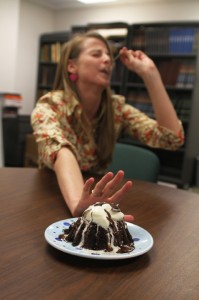
Resolved students find help in campus programs
By Molly Dunn
Reporter
Sticking to New Year’s resolutions is difficult for almost everyone, especially when the goal is to be healthier. Life gets in the way, old habits creep back and resolutions go unfulfilled. But there is hope.
Baylor offers many opportunities through programs, events, facilities and various activities for faculty and students to stay fit.
“Students need to define what their goals are,” Van Davis, assistant director for Fitness and Nutrition Education at Baylor, said. “The goals need to be specific, measurable; it needs to be something that is attainable, realistic and timely.”
When creating these goals, Davis believes the act of writing them down leads to successful results.
“One of the best things is to look and see where they are right now,” Davis said. “You need to know where you are before you can go somewhere.”
The McLane Student Life Center offers fitness assessments to measure body fat percentage, flexibility and blood pressure, helping faculty and students find out where they are right now. This makes charting progress easier, allowing students to achieve their resolution. In fact, from 3 to 5 p.m. today, the student life center is offering fitness assessments in front of the fitness center.
“We really focus on long-term and short-term goals and how important it is that you have short- term goals line up with your long-term goals so that you can eventually meet that long-term goal,” said Jennifer Spear, senior peer nutrition educator at the McLane Student Life Center.
The peer nutrition educators at the student life center offer guidance, advice and helpful tips for students who want to live a healthier life.
“We also help them modify their goals. That way they are attainable. Because one of the problems that people always have with their goals is that they set them way too high,” said Bekkah Limon, senior peer nutrition educator.
By creating short-term and long-term goals that are achievable, students can find themselves following their resolution and seeing successful results.
“A number is achievable. If you have a quantifiable amount, then you actually are able to achieve that and know that you achieved it,” Spear said.
Writing and planning fitness and nutrition goals is an important step in being successful, Davis said.
Students should use short term goals, such as spring break, to find motivation to workout, eat right and lead a healthy lifestyle. But repeating the same routine may cause the body to lose motivation and commitment, so Davis suggests that students find a variety of activities, especially with an “accountability partner” to help each other stay on track.
“Find two or three things that you enjoy doing and then spread it out across the week, because if all you do is get on the treadmill and run or walk, and that’s all you do, it gets boring,” Davis said.
At Baylor, students can participate in a multitude of activities through the 40 classes offered in bearobics, bearcycle classes, personal training and many other group or individual exercises.
This advice for fitness can also be applied to nutrition.
“You don’t have to take something completely out of your diet because it is more fattening,” Spear said. “It is all about customizing your diets so that you can live a healthier lifestyle that is tailored to your culture and your habits.”
Changing diet and workout routines does not have to be boring or a punishment. In fact, Davis said students should reward themselves after sticking with their goal for four weeks.
“Statistics show that if we set smart goals, and we keep that consistent for about four weeks, and if we have a reward system, people are a lot more successful,” Davis said.
For more information about personal training, programs at the McLane Student Life Center or about signing up for a free fitness orientation, contact Van Davis at van_davis@baylor.edu, or visit the Department of Wellness in room 305 of the student center for information on peer nutrition education.